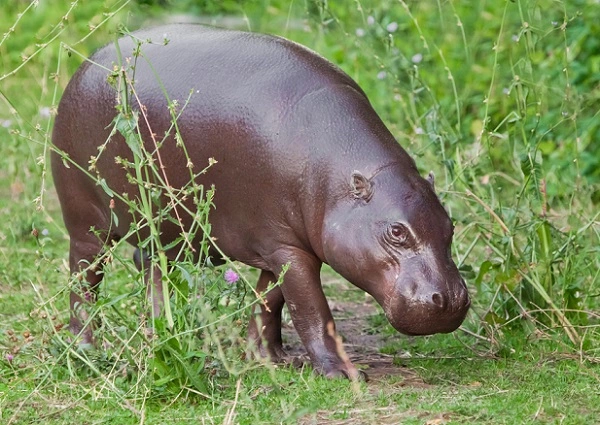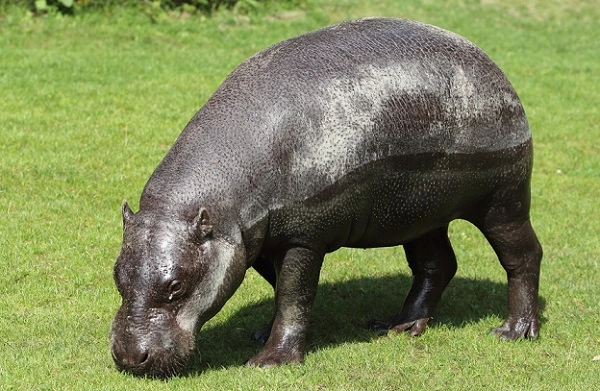The pygmy hippopotamus (Choeropsis liberiensis) is a small hippopotamus found in the forests and swamps of West Africa. They are significantly smaller than other hippos, measuring only 2.5 to 3.5 feet long and weighing 120 to 275 pounds. Despite their small size, pygmy hippos are still dangerous animals, capable of inflicting serious injuries with their sharp tusks. While they were once considered common throughout their range, pygmy hippo populations have declined significantly in recent years, and they are now considered endangered. Efforts are currently underway to protect these fascinating creatures from extinction.

Pygmy Hippopotamus Description
Pygmy hippopotamuses are small, compact versions of the common hippopotamus. They are found in the forests and swamps of western Africa, where they spend most of their time hiding in the dense vegetation. Pygmy hippos are nocturnal creatures, emerging at night feed on grasses and other plants. They are also very good swimmers and can often be seen wading in the rivers and streams that run through their habitat. Pygmy hippos are shy and solitary animals, and they are rarely seen by humans. However, they are an important part of the African ecosystem, and their numbers are declining due to habitat loss and hunting.
Pygmy Hippopotamus Habitat
Pygmy hippopotamus are found in Ivory Coast, Guinea, Liberia, and Sierra Leone. Pygmy Hippopotamus are habitat specialists, occupying only humid forest and gallery forest habitats. Pygmy Hippopotamus are strict vegetarians, feeding on a variety of plant species. The Pygmy Hippopotamus is a solitary creature, meeting only to mate. Pygmy Hippos give birth to a single calf after a gestation period of 210 days. Pygmy Hippopotamus calves remain with their mothers for up to 16 months. Pygmy Hippos reach sexual maturity at 3-5 years old. The lifespan of Pygmy Hippos is unknown in the wild but individuals have lived up to 24 years old in captivity. Although the Pygmy Hippo is not considered a threatened species, their numbers are declining due to habitat loss and hunting pressure. The Pygmy Hippo is protected by national laws in all countries where it occurs and is listed as Appendix II on CITES.
Pygmy Hippopotamus Diet
Pygmy Hippopotamus diet consists mostly of grasses and aquatic plants. They will occasionally eat fruits,roots and carrion. Pygmy Hippopotamus are selective in what they eat and will spend several hours a day grazing. Pygmy Hippopotamus usually eat in the morning and evening, with a rest period during the hottest part of the day. Pygmy Hippopotamus have large incisors and canines that they use for defense and to crush tough vegetation. Pygmy Hippopotamus are herbivores that play an important role in their ecosystem by dispersing seeds in their dung and through their grazing habits. Pygmy Hippopotamus are shy and reclusive animals that are under threat from habitat loss and hunting.

Pygmy Hippopotamus Size
Pygmy hippopotamuses are much smaller than their close relative, the common hippopotamus. Pygmy hippos are about 1.5 to 1.8 meters long and weigh between 250 and275 kilograms. They are different from common hippos in other ways, too. Pygmy hippos have a more squat body shape and their legs are shorter in proportion to their body size. Their skin is also much thicker and less hairless than that of common hippos. Pygmy hippos live in western Africa, in countries such as Liberia, Sierra Leone, and Ivory Coast. They inhabit dense forests near rivers and swamps. Pygmy hippos are nocturnal animals and are rarely seen by humans. Sadly, they are also endangered due to hunting and habitat loss.
Pygmy Hippopotamus Lifespan
Pygmy hippopotamuses are native to the forests and swamps of West Africa. They are smaller than their more common cousins, the common hippopotamus, and can weigh up to 1,100 pounds. Pygmy hippos are shy and solitary animals that are mostly active at night. They spend most of their time in the water, where they graze on aquatic plants. Pygmy hippos typically live to be about 28 years old in the wild, although captive animals have been known to reach the age of 50. Pygmy hippos are endangered due to habitat loss and hunting. However, conservation efforts are currently underway to help protect this unique species.
Pygmy Hippopotamus Behavior
Pygmy hippopotamuses are shy and reclusive animals that live in the dense forests of western Africa. They are closely related to the common hippopotamus, but are much smaller, weighing only about 550 pounds. Pygmy hippos are nocturnal animals that spend most of their time alone or in pairs. They are excellent swimmers and can hold their breath for up to six minutes underwater. Pygmy hippos primarily eat leaves, fruits, and other vegetation. They are very seldom seen by humans and are considered to be one of the most elusive animals on Earth. Pygmy hippos are endangered due to habitat loss and hunting pressure from humans. Although they are protected by law, their numbers continue to decline.
Pygmy Hippopotamus Speed
Pygmy hippopotamuses are relatively small compared to their larger relatives, but they are just as capable of moving quickly when they need to. While they are not known for being particularly fast runners, they can reach speeds of up to 30 kilometers per hour in short bursts. Pygmy hippos are also good swimmers and can hold their breath for up to five minutes, making them well-adapted to life in the water. In addition, their compact bodies and small legs make them excellent climbers, and they are often seen clambering up out of rivers and onto banks. Pygmy hippos may not be the quickest animals on the plains, but their speed and agility make them well-suited to life in the jungle.
Pygmy Hippopotamus Hunting
Pygmy Hippopotamus hunting is a popular sport in many parts of Africa. Pygmy Hippopotamus are hunted for their meat, which is considered a delicacy, and for their horns, which are used to make cups and other ornamental objects. Pygmy Hippopotamus are also hunted for their skin, which is used to make leather goods. Pygmy Hippopotamus hunting is regulated by law in many countries, and hunters must obtain a license in order to hunt Pygmy Hippopotamus. Pygmy Hippopotamus hunting is typically done with firearms, although bows and arrows are also sometimes used. Pygmy Hippopotamus are difficult to track and elusive animals, making them a challenging target for hunters. Pygmy Hippopotamus hunting typically takes place in the months of December and January, when the Pygmy Hippopotamus are most active.
Conclusion
The pygmy hippopotamus is an interesting creature that is sadly becoming increasingly rare. With its dwindling numbers, it is important to learn more about this animal and do what we can to help protect it. If you’re interested in learning more about the pygmy hippo or want to help contribute to its conservation, please visit our website for more information.
Frequently Asked Question

